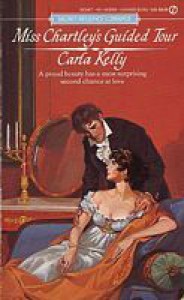So.... Nicky?
Pretty much all books, history, science, civil rights, anime, travel, or, you know, baby animals.
Marriage Laws, Rites, Records & Customs: Was Your Ancestor Really Married?
 A short and surprisingly lively account of the bewildering rules concerning marriage in England, Scotland, Wales, and Ireland over the past millenium. Written to help genealogists, the details also are useful to writers trying to figure out whether English people who married at sea were legally wed, why people traveled to Scotland to marry (to avoid taxes as well as family, it turns out), and much more. Hand-fasting, rape-marriage, marriage-by-capture, elopement, common-law marriage, penny weddings, proxy marriage, cermonialized marriage, companionate marriage.
A short and surprisingly lively account of the bewildering rules concerning marriage in England, Scotland, Wales, and Ireland over the past millenium. Written to help genealogists, the details also are useful to writers trying to figure out whether English people who married at sea were legally wed, why people traveled to Scotland to marry (to avoid taxes as well as family, it turns out), and much more. Hand-fasting, rape-marriage, marriage-by-capture, elopement, common-law marriage, penny weddings, proxy marriage, cermonialized marriage, companionate marriage. I was surprised to find the rules had changed so much, and often back and forth, even into the 18th and 19th centuries. And it wasn't until *1950* that adopted children in England and Wales had the same legal rights as natural-born children!
Chapman cites so many times when a couple whose marriage was fully legal under one set of laws (esp. around Reformation) could potentially be considered null or even illegal later, with serious harm to their now-illegitimate children. And heaven help you if you didn't follow the exact rules in force at the time you were wed. Chapter Three is even titled, "Truly Married? - Interpreting the Laws." One favorite line: "Moreover, an irregular or a regular marriage could be valid or invalid and could also be clandestine."
100 pages of thoughtful stuff, and many story ideas. Makes me curious about the rest of the "Chapman Records Cameos" series.
The British Soldier in the Peninsular War: Encounters with Spain and Portugal, 1808-1814
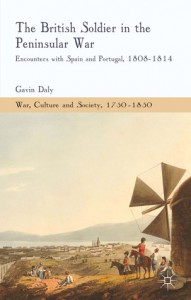 Just what I've been looking for: A survey of what British soldiers thought of the country and the people of Spain and Portugal while living cheek by jowl with them (via billeting and campaigning). Chapters include To the Peninsula (preconceptions), First Contact: Lisbon, Landscape and Climate, Billets and Hospitality, Searching for Civilization, The Religious World, and 'Dark-Eyed Beauties.' The culture clash is vivid with great details.
Just what I've been looking for: A survey of what British soldiers thought of the country and the people of Spain and Portugal while living cheek by jowl with them (via billeting and campaigning). Chapters include To the Peninsula (preconceptions), First Contact: Lisbon, Landscape and Climate, Billets and Hospitality, Searching for Civilization, The Religious World, and 'Dark-Eyed Beauties.' The culture clash is vivid with great details. Missing was mention of British women, wives and camp followers. It does seem like the presence of hundreds or thousands of one's countrywomen might have some effect.
Shades of Milk and Honey
 Sweet, smooth telling, a story in the style of Austen with added magicks. Kind of wished for a little spritz of the astringent that is also in Austen; maybe in the next book?
Sweet, smooth telling, a story in the style of Austen with added magicks. Kind of wished for a little spritz of the astringent that is also in Austen; maybe in the next book?
New cover for An Untitled Lady! Aiming for readers who like historical fiction as well as love stories. Goes on sale this Tuesday (March 3).
Waterloo: The French Perspective
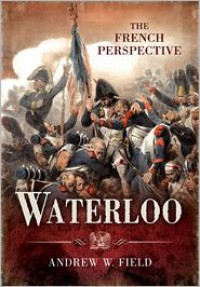 Nice tonic to the rah-rah British perspective of some Waterloo histories. *Extensive* quoting from diaries and memoirs by French officers and soldiers open up that side of the battle in a way I had not read before. Excerpts by British and Prussian participants help round out the picture, which is not as simple as "Napoleon was on top of things/Napoleon was not all there." For a fiction writer who only poorly reads French, these first-person excerpts are gold.
Nice tonic to the rah-rah British perspective of some Waterloo histories. *Extensive* quoting from diaries and memoirs by French officers and soldiers open up that side of the battle in a way I had not read before. Excerpts by British and Prussian participants help round out the picture, which is not as simple as "Napoleon was on top of things/Napoleon was not all there." For a fiction writer who only poorly reads French, these first-person excerpts are gold.Chapters are well organized and build on each other. Field explains military tactics and strategy well enough for me to see the reasoning behind some of the moves that seem, from the British perspective, mysterious. Maps very helpful.
Legend
 Rollicking teen adventure in a California gone martial; fun read on a cold winter sick-day. I could have wished the line between good and bad wasn't drawn so blindingly wide, but the smart lead characters made up for it. Still, they're so smart... they couldn't have seen shades of gray?
Rollicking teen adventure in a California gone martial; fun read on a cold winter sick-day. I could have wished the line between good and bad wasn't drawn so blindingly wide, but the smart lead characters made up for it. Still, they're so smart... they couldn't have seen shades of gray?
Monstrous Regiment: The Play
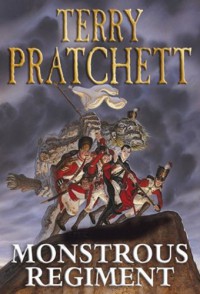 Well-paced story with nice twists and the usual strong Pratchett voice and theme-trumpeting. Would make a fine film--many roles for women!
Well-paced story with nice twists and the usual strong Pratchett voice and theme-trumpeting. Would make a fine film--many roles for women!
There and back again
I had a fantastic time touring Santiago, Punta Arenas, Puerto Natales, and the fjords and glaciers of Chile; Torres del Paine National Park and Buenos Aires in Argentina; and Iguassu Falls, from both the Argentinian and the Brazilian sides. Took many, many photos (and got story ideas), but I like this one best, taken by fellow tour member PC. Like Elsa! Except, well, the cold does bother me a little.
I thought about writing blogposts about each leg of the trip, but on the way home I caught a cold so wicked it looks like I got punched in the eye, so I’ve been sleeping a lot instead. Might settle for a photo album; not sure the timing now that the Holidays are upon us. But I did write about Napoleon on England’s shores for the December blog party over at Deanna Raybourn’s site this week. She writes cool travel stories, some set in the 1920s–very fun!–and is playing the gracious hostess to more than two dozen fellow historical and adventure writers. Already I have a list of their books to check out this year, and the month is only half over.
Now I'm thinking I'll use the photos I took on vacation as writing prompts for January; if at the end of the month I have something worth making into a real story, then huzzah! If not, practice is always good ;-)
Information Doesn't Want to Be Free: Laws for the Internet Age
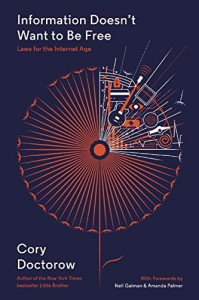 A quick and easy read that will get you thinking long and hard. What do we want our interconnected society to be? Should we let entertainment companies write our laws governing how computers and connections work? Is privacy a right for people or just for corporations? Short segments give good explanations and history of copyright, piracy, how computers have worked and work now, but the solution bits at the end weren't as fleshed out as I could wish. Guess I'll have to do the thinking.
A quick and easy read that will get you thinking long and hard. What do we want our interconnected society to be? Should we let entertainment companies write our laws governing how computers and connections work? Is privacy a right for people or just for corporations? Short segments give good explanations and history of copyright, piracy, how computers have worked and work now, but the solution bits at the end weren't as fleshed out as I could wish. Guess I'll have to do the thinking.
A Passage to India
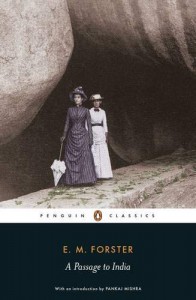 SPOILERS
SPOILERSSo well done. I was so deeply invested in all the story people, especially Dr. Aziz, that when he finds himself in great trouble (at end of Part One), I could not continue reading. I even went to Wikipedia to read the synopsis to make sure he survived, but I still couldn't make myself go on with the story. Maybe I just did not want to be so intimate with another 'horrors of colonialism' story, though I've read plenty of others, fiction and non-fiction. I know the pattern, I see it in my imagination already playing out, and it pains me. Could readers feel the same about the hard issues I write about?
A Room with a View
 A study in quick characterization and hard-working dialogue that feels easy. This is the second time I’ve read and enjoyed this, so the 5 stars, but this story leaves me with a puzzling problem. SPOILERS throughout the rest of this.
A study in quick characterization and hard-working dialogue that feels easy. This is the second time I’ve read and enjoyed this, so the 5 stars, but this story leaves me with a puzzling problem. SPOILERS throughout the rest of this. I read this a while back, before or just after the film version came out, and I remember loving every bit of it. But I did not remember at all that main bit of the last chapter, where the author has to acknowledge that his hero, George, had no agency throughout the book [structure problem]. He does this well, by having George think it to himself:
He was a boy after all. When it came to the point, it was she who remembered the past, she into whose soul the iron had entered, she who knew whose room this had been last year. It endeared him to her strangely that he should be sometimes wrong.
… All the fighting that mattered had been done by others—by Italy, by his father, by his wife.
Not too romantic. Meanwhile, Lucy has lost all – her standing at home, the affection of her mother and her brother, even the goodwill of two-faced Mr. Beebe. She pays a high price for the affection of a man she now calls in this chapter a baby:
"George, you baby, get up."
"Why shouldn't I be a baby?" murmured George.
Unable to answer this question, she put down his sock, which she was trying to mend, and gazed out through the window.
Who wants to marry a baby? But I remember this book as very romantic, and it’s billed as a romance. Is this some sly move on Forster’s part to lure in the romantic reader and spoon her some reality as well? “Sure love, but you pay for it.” If so, the revelation about Charlotte does the trick—quickly distracting us from the continuing-to-be-bad choices women face and to the completion of a romantic arc from before Lucy’s times.
So perhaps this is a good model of cutting your somber social comedy with the honey of romance and youth (and Italy). Which contemporary books do this as well?
Ficciones
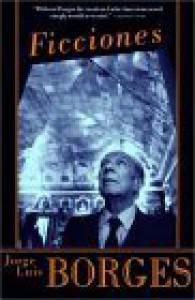 Challenging and full of ideas; I'm still chewing on it, two weeks out. If you haven't read dense fiction in awhile, I'd start with the stories in Part Two, then track back to Part One. Wasn't as much a fan of the ones that were meta-literary criticism, though these have many clever bits. All are stories within stories, intricate and clever. Faves include The Secret Miracle (about a writer!), The Garden of Forking Paths, The South (which Borges says in his intro is his best; I might disagree), Theme of the Traitor and Hero (for writers), Three Versions of Judas. I'd read Pierre Menard for a class, which ruined it for me; I didn't think I liked Funes, the Memorious but thinking back on it now I like it more.
Challenging and full of ideas; I'm still chewing on it, two weeks out. If you haven't read dense fiction in awhile, I'd start with the stories in Part Two, then track back to Part One. Wasn't as much a fan of the ones that were meta-literary criticism, though these have many clever bits. All are stories within stories, intricate and clever. Faves include The Secret Miracle (about a writer!), The Garden of Forking Paths, The South (which Borges says in his intro is his best; I might disagree), Theme of the Traitor and Hero (for writers), Three Versions of Judas. I'd read Pierre Menard for a class, which ruined it for me; I didn't think I liked Funes, the Memorious but thinking back on it now I like it more.Sample:
“In all fiction, when a man is faced with alternatives he chooses one at the expense of the others. In the almost unfathomable [fiction of] Ts’ui Pên, he chooses— simultaneously—all of them. He thus *creates* various futures, various times which start others that will in their turn branch out and bifurcate in other times. This is the cause of the contradictions in the novel.
"Fang, let us say, has a secret. A stranger knocks at his door. Fang makes up his mind to kill him. Naturally there are various possible outcomes: Fang can kill the intruder, the intruder can kill Fang, both can be saved, both can die and so on and so on. In Ts’ui Pên's work, all the possible outcomes occur, each being the point of departure for other bifurcations. Sometimes, the pathways of this labyrinth converge. For example, you come to this house; but in other possible pasts you are my enemy; in others, my friend.” -- The Garden of Forking Paths, p 98
In Patagonia
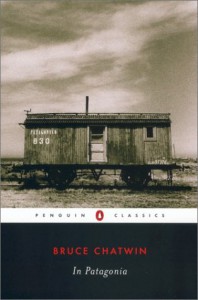 More tone poem than travelogue, this reads like a series of evenings at an especially erudite, obsessive uncle's house. An uncle who falls asleep rather quickly after dinner, so keeps his stories short.
More tone poem than travelogue, this reads like a series of evenings at an especially erudite, obsessive uncle's house. An uncle who falls asleep rather quickly after dinner, so keeps his stories short.
The Light Fantastic
 Turns out Pratchett works for me only in small doses. Tried to read this directly after Discworld #1. Will try again with this later... maybe.
Turns out Pratchett works for me only in small doses. Tried to read this directly after Discworld #1. Will try again with this later... maybe.
Lock In
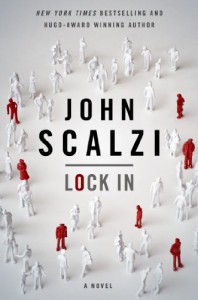 Well-made, great ride. Despite the seriousness of some of the subject matter -- locked-in syndrome, corporate sociopathy, government safety net dissolution, murder of innocents -- this police-procedural adventure goes down easy. Snappy dialogue catches lots of today's catch phrases ("You OK sis," "...is a thing"). I never worried for the good guys because they're all so clever, positive, and on the side of Good. A sci-fi comfort read.
Well-made, great ride. Despite the seriousness of some of the subject matter -- locked-in syndrome, corporate sociopathy, government safety net dissolution, murder of innocents -- this police-procedural adventure goes down easy. Snappy dialogue catches lots of today's catch phrases ("You OK sis," "...is a thing"). I never worried for the good guys because they're all so clever, positive, and on the side of Good. A sci-fi comfort read.Somehow reminded me of Lois McMasters Bujold; still trying to figure out why.




 1
1
 3
3

